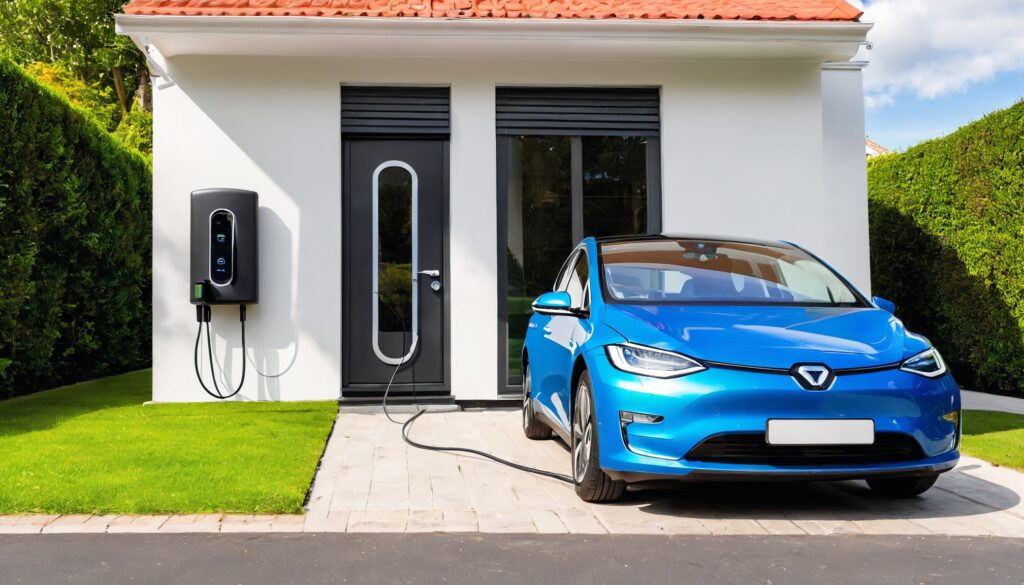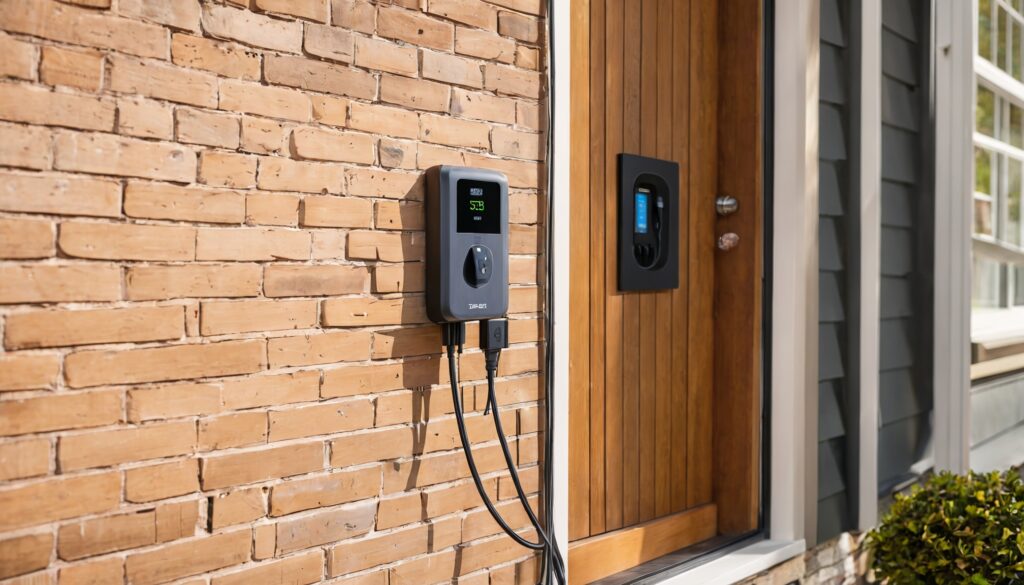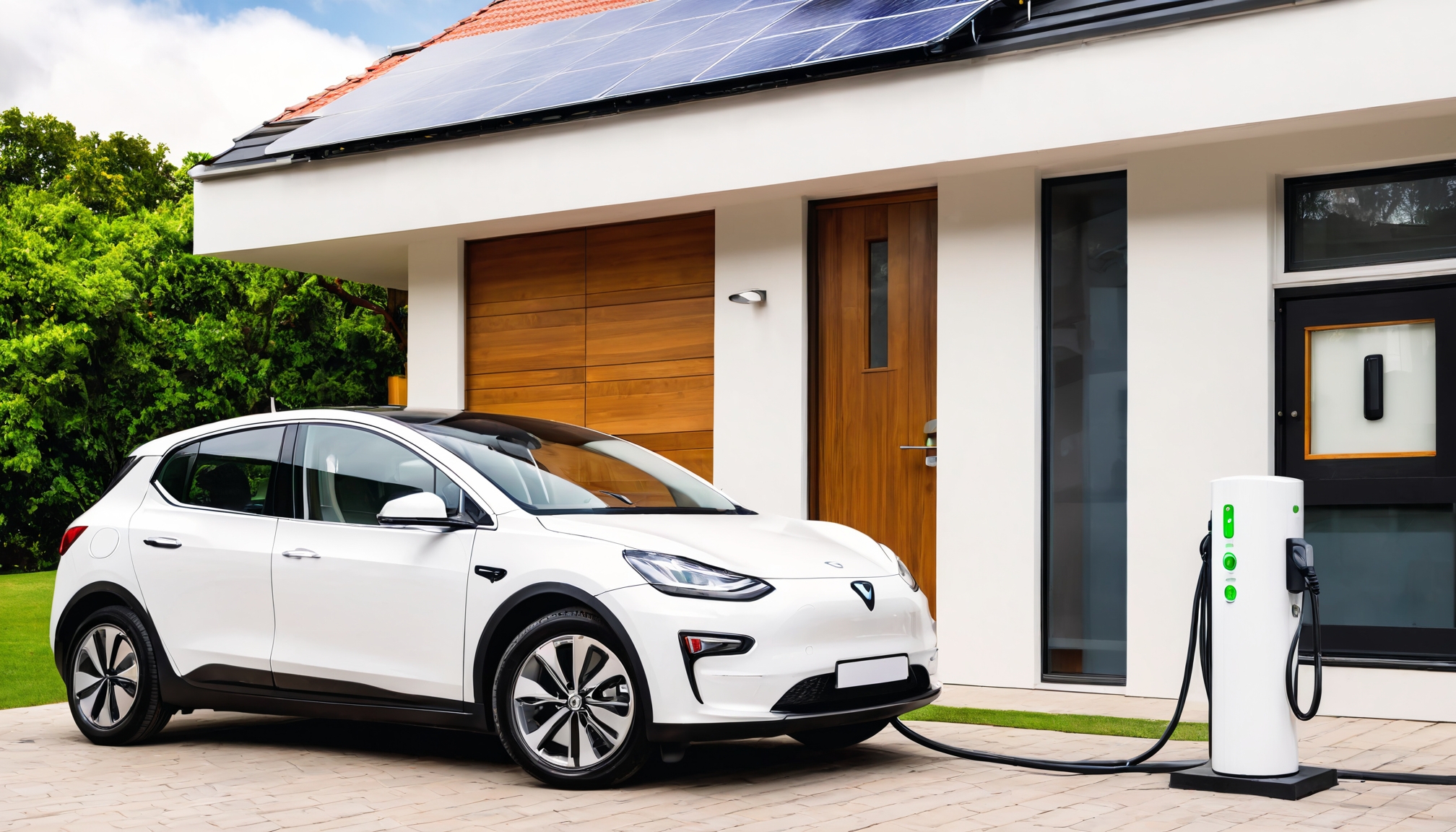As global interest in electric vehicles (EVs) expands, homeowners are considering how best to charge them at home. Knowing exactly how much it costs (Charging Electric Cars at Home) can make an enormous difference on monthly costs; by employing effective methods and tools you can manage them and still enjoy driving an EV!
In this article we’ll go over the cost of home charging, examine the variables that influence the cost of charging your electric vehicle as well as help in providing useful tips to benefit reduce energy usage and improve the charging configuration.

Home EV Charging Costs: What Factors Affect the Price?
When it comes time to charge your electric vehicle from your home, there are a number of factors that determine amount you’ll paying for electricity:
- Electricity Prices: The amount you pay per kilowatt hour (kWh) to use electricity is depending on the utility company, timing of the day, and the plan you selected.
- Size of your battery: Your car’s battery determines how much power is required for charging your vehicle fully.
- Charging equipment: The use of the one-level (120V) as well as a level 2. (240V) charge station at home could impact the speed and effectively you charge your electric vehicle.
- Charging habits What frequency you charge, if you charge in peak hours or off-peak times and also your driving habits play a an important role in the energy you use.

Average Costs of Charging an EV at Home
Charge your electric car at home is typically cheaper in comparison to with charge points in public, but what is it going to cost? To estimate your home electric vehicle charges, apply this formula:
Charging Cost = Battery Size (kWh) x Cost of Electricity ($/kWh)
If you have Tesla Model 3, which contain a battery with a capacity of 60 kWh. The local electricity price of $0.13 for each kWh. Here’s how you determine the cost:
| Factor | Example |
|---|---|
| Battery Size (kWh) | 60 kWh |
| Cost of Electricity | $0.13 per kWh |
| Total Charging Cost | 60 kWh x $0.13 = $7.80 |
In that case it cost around $7.80 in order to fully charge the Tesla Model 3 at home.
Level 1 vs Level 2 Charging
Another crucial aspect is the kind of charging station you’re with. Home charging stations are of two kinds:
- level 1 charging It uses an outlet that is standard 120V and charges your electric vehicle slower. Ideal for individuals who commute short distances or don’t require charging their vehicles daily.
- Level 2 charging uses an outlet rated for 240V, similar to what large appliances like dryers require, to quickly recharge your vehicle. Installing one requires professional electrician services; however it’s a better choice for frequent travelers.
| Type of Charging | Voltage | Charging Time | Cost of Installation |
|---|---|---|---|
| Level 1 Charger | 120V | 8-20 hours for a complete charge | $0 (standard outlet) |
| Level 2 Charger | 240V | 4-8 hours to complete charge | $300-$1,200 installation |
Although the cost of installing the Level 2 charger can be expensive however it can reduce the time required to charge your car and will allow you to make use of off-peak rates for electricity which could reduce your expenses over the long term.
How to Conserve on Your Electricity Bill When Charging at Home
The cost of electricity while charging your electric vehicle at home does not have to be difficult. With a few simple strategies, you can cut down on your energy usage and maintain your vehicle’s charge. Below are a few suggestions to benefit you reduce your charging expenses:

1. Advantage of Time-of-Use Rates
Many utilities offer time-of use (TOU) electricity prices, only difference is based on timing of the day. Electricity costs are typically lower when it is not in peak hours, generally during the night or early in the morning when the demand is less. By scheduling your EV’s charge at these hours, you could drastically reduce your electric bill.
- High Hours Rates are higher during the daylight hours (e.g. 4 PM to 9 pm)
- Off Peak Hours Rates lower overnight (e.g. 10 pm – 6 am)
Many electric vehicles come with apps or car settings that let you program charging for off-peak times and automatically reduce your expenses.
2. Optimize Your Home Charging Setup
The investment in energy-efficient equipment could benefit to reduce the overall expense of charging your home. For instance installing a level 2 charger could come with initial costs but the decreased charge time and higher energy efficiency could pay for itself in the long run.
Also, search for charging stations that have intelligent features that permit you to track your consumption of energy and control the charging process remotely. Some models integrate with the energy management system of your home to optimize charging alike to the current rates of electricity.
3. Solar Power: Sustainable Solution
If you want to reducing power bills, think about installing solar panels in your home. In the event that you produce your own energy it could run your vehicle on battery power at no cost (once your initial expenses of solar installations are recovered).
Solar energy systems may also be paired with storage for energy (such as the Tesla Powerwall), allowing you to store any excess solar energy in the daytime and use it to power your vehicle overnight.
| Charging Method | Monthly Costs (est.) | Key Savings Benefit |
|---|---|---|
| Grid Electricity | $20-$50 | economize in off-peak hours |
| Solar Power | Minimal after installation | Free post-installation charging after installation |
4. Use Energy-Saving Modes
Some electric cars come with eco-mode or energy-saving options that can reduce how much energy required to charge your car. By activating these modes, you’ll be able to make the most of every charge, particularly if you do not need to charge your vehicle to its maximum capacity for short journeys.
5. Monitor Your Energy Consumption
Be aware of the energy usage of your home will benefit you find areas where you might be together too much power. Smart meters, supplied by numerous utility companies, enable you to track your energy usage in real-time. This information can be used to modify your lifestyle like charging at times that are not peak or restricting other high-energy activities when charging your electric vehicle.
6. Apply for Utility Company Rebates and Incentives
Many utilities as well as government programs offer incentives for EV owners. These incentives may help lower both charging costs and installation fees for home charging stations. Get in touch with your utility company to see if there are discounts on electricity usage or when purchasing an electric home charger.
Maximizing Efficiency: Calculating the Real Costs of Home Charging

To have a better understanding of the home’s expenses You can estimate the annual total cost depending on the driving habits you have. Here to estimate it:
- Determine Annual Mileage: Let’s say that you drive 12,000 miles per year.
- Miles per kWh: The majority of EVs have about 3-4 miles for each kWh.
- Electrical Cost: Using an average electricity cost of $0.13 per Kilowatt.
Example Calculation:
- Annual Energy Utilization 12,000 miles/ 3.5 miles for each kWh equals 3,429 kWh each year.
- Annual Charge Cost $3429 kWh divided by $0.13 = $446 annually.
| Annual Mileage | Miles per kWh | Total Energy Used (kWh) | Cost of Charging ($/kWh) | Annual Charging Cost |
|---|---|---|---|---|
| 12,000 miles | 3.5 miles/kWh | 3,429 kWh | $0.13 | $446 |
This finding will give you an estimate of the cost of charging your electric vehicle at home on a monthly basis.
FAQs
How can I cut down on charges for charging the electric vehicle at home?
You can cut down on the expense by charging during non-peak times, with an EV charger, and observing your consumption of energy.
Which method is more cost effective: charging at home or public charging stations?
In most instances, charging at home is cheaper than public charging if done during off-peak hours or using an energy plan with time-of-use billing.
How long will it take to fully charge my electric vehicle at home?
The duration depends on your charger – for instance, using a Level 1 charger could take 8-20 hours while using an L2 charger can do the trick in 4-8 hours.
Can I charge my electric vehicle using solar power at home?
If your home already boasts a solar energy system, using that power to charge an EV will drastically decrease charging fees or even eliminate them altogether once your system has been paid for.
Will charging my electric car significantly lower my electric bill?
Charging an EV may provide some boost to your bill; however, the benefit is typically smaller than gasoline for conventional cars and could increase monthly costs on average.
Conclusion
While charging your electric car at home may be convenient, it’s essential to carefully consider all costs and ways of cutting down your electricity bill. By setting rates based on time-of-use and adjusting charging configuration settings accordingly as well as exploring alternatives such as solar energy you can significantly decrease costs associated with charging an EV at home. As more electric vehicle markets emerge, homeowners will likely discover new strategies for increasing charging efficiency and decreasing expenses.


If you would like to get a great deal from this post then you have too
apply such methods to your won weblog. https://evolution.org.ua/